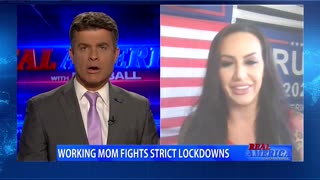Two imposing threats to conservatism: Lindsey Graham
There are two threats to conservatism, according to Sen. Lindsey Graham. Actually, there are many threats but Graham focused on the two that currently loom the largest and are the most imposing.
They are: First, unregulated social media companies and, second, unverified mail-in voting.
Specifically, Graham said, “There’s two threats to conservatism: mass mail-in voting unverified, and social media companies unregulated, unable to be sued when they take down the content of conservatives.”
Big social media corporations, such as YouTube and Facebook, routinely remove content they don't like. In fact, the companies have the right to remove user accounts without explanation.
For example, I recently uploaded a very short video to YouTube that contained little more than excerpts from a Senate hearing on COVID-19. Even though the exact same content was posted on YouTube multiple times by other channels, YouTube removed it without any explanation other than it violated their terms and conditions which, as you know, are vague.
In effect, YouTube — or, more accurately, humans working within the corporate framework — are controlling the thoughts of its viewers by controlling which content may be available to the brains of those viewers. YouTube is, in my opinion, a thought control mechanism. I mean, literally, a thought control mechanism. When it purposefully and intentionally diminishes perspectives with which it disagrees, that's thought control. Again, the word "it" represents humans within the corporation.
There are elements of hypocrisy.
The far-left loves to tout equality and equity as a moral virtue, but only when it advances the Marxist agenda. Social media intentionally discriminates based solely on one's perspective. Granted, there appear to be far more right-of-center content creators than left-of-center creators.
A generation ago it was the far-left that damned book-burning in Germany during the National Socialist era. Today, far-lefts are the book burners and are proud of it.
Maybe social media's controllers are attempting to maintain a balance between right and left. But that doesn't seem to be the case: YouTube and Facebook appear to be intentionally choking conservative views simply because the people controlling those corporations disagree with conservative views.
So, what's wrong with that? What's wrong with YouTube and Facebook expressing their opinion by silencing those who are expressing differing opinions? Censorship is, after all, a form of free speech.
The problem is that people make decisions based upon information and when information is incorrect, people make incorrect decisions. It is for that reason the free speech exists: To allow us to make informed decisions. When people are harmed by incorrect information, they have a right to seek justice in a court of law. You can't mislabel a product with untrue claims.
That problem is exasperated when a clique of publishers dominates the flow of information, limiting free speech. It's akin to a courtroom in which only one side is allowed to present evidence.
Granted, there are other venues, such as Rumble and Gab, but those alt-media sites are small and nowhere near as influential as YouTube and Facebook.
The second problem is unregulated mail-in voting.
Democrats love mail-in voting for two reasons: First, many Democrats are too lazy to go to a voting place and cast a ballot. However, they will fill out a ballot and mail it. Democrats cornered the lazy vote a long time ago with welfare advocacy.
Democrats also love mail-in ballots because you can fill one out on your kitchen table while a party thug looks over your shoulder, then pays you fifty dollars for checking the right boxes. $50,000 buys one thousand votes.
To most of us, that sounds terribly expensive. But consider that Joe Biden's campaign had over $1.04-billion dollars with another $581-million held by advocacy groups. The advocacy groups, alone, had enough to buy 11,620,000 votes at $50 per vote. It's called ballot harvesting. [source]
The point is: Mail-in ballots are fine for people who cannot get to a polling place.
The other problem with mail-in ballots is they are easy to counterfeit. Voting in person makes it virtually impossible to counterfeit ballots, particularly when identification is required to cast a ballot.
-
 7:55
7:55
One America News Network
3 years agoDan Ball W/ Lindsey Graham
15K23 -
 0:22
0:22
QueBall17
3 years ago $14.88 earnedLindsey Graham Mic Drop
15.3K11 -
 3:03
3:03
TimeIsNow
3 years agoLindsey Graham - "The World Is Watching"
899 -
 9:40
9:40
BonginoReport
3 years agoLindsey Graham Questions Twitter and Facebook's CEOs on Censorship
5.93K14 -
 33:10
33:10
TudorDixon
17 hours agoWhat's Planned Parenthood's Role in Gender Ideology? | The Tudor Dixon Podcast
2.9K4 -
 42:22
42:22
The Why Files
2 days agoProject Looking Glass | The Time Warriors of the 2012 Apocalypse
15.8K45 -

Major League Fishing
2 days agoLIVE Bass Pro Tour: Stage 5, Day 1
46.1K3 -
 1:48:49
1:48:49
Barstool Yak
6 hours agoThe Yak with Big Cat & Co. Presented by Rhoback | The Yak 6-6-24
13.1K3 -
 23:33
23:33
Lou Dobbs
15 hours agoThe Great America Show - Dark Money, Marxist Dem Nightmare
29.5K8 -
 1:05:28
1:05:28
Ben Shapiro
3 hours agoEp. 1980 - From The Greatest Generation To The Most Obnoxious Generation
50.2K60